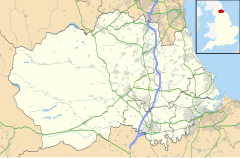West Auckland
| West Auckland | |
|---|---|
| West Auckland shown within County Durham | |
| Population | 8,509 (2011.Ward) |
| OS grid reference | NZ180263 |
| Unitary authority | |
| Ceremonial county | |
| Region | |
| Country | England |
| Sovereign state | United Kingdom |
| Post town | BISHOP AUCKLAND |
| Postcode district | DL14 |
| Dialling code | 01388 |
| Police | Durham |
| Fire | County Durham and Darlington |
| Ambulance | North East |
| EU Parliament | North East England |
| UK Parliament | |
West Auckland is a village in County Durham, in North East England, to the west of Bishop Auckland on the A688 road. It is not known exactly when West Auckland was first inhabited, but there is evidence of Auckland West in the history of St. Cuthbert in the 11th century. The Bolden Book in 1183 showed that at that time West Auckland was inhabited by a number of serfs who were part of the tenantry of the Bishop of Durham, Hugh de Puset, the first of the Prince Bishops. The creation of a church dedicated to St. Helen in the 13th century in Auckland West heralded the beginning of a separate community in what later became known as St. Helen Auckland. After the opening of the Stockton and Darlington railway in 1825, the search for coal escalated dramatically in the West Auckland area and the population increased as a consequence with the promise of employment. By the turn of the century, West Auckland colliery employed 620 men. The colliery closed in July 1967. The village of West Auckland is reputed to have one of the largest village greens in the country, lined with 17th and 18th century buildings.
West Auckland Town F.C. is famously the 'Home of the First World Cup', as its football team were the winners of the Sir Thomas Lipton Trophy, one of the first international footballing competitions, in its two initial years (1909 and 1911) and were therefore, by the rules of the competition, awarded the trophy to keep in perpetuity.
The Trophy was initiated by businessman and sporting enthusiast Sir Thomas Lipton, who wished to see a competition between the leading football clubs of Europe. The football associations of Italy, Germany and Switzerland duly complied.The often told story was that the Football Association of England refused to nominate a club and Woolwich Arsenal F.C., addressing it to W.A. A.F.C. was approached. The unspecific address caused the letter to be sent to the wrong team, West Auckland A.F.C, and thus the eclectic group of coal miners pawned their belongings and duly made the journey to Turin. However recent research shows this to be incorrect. Many of the players paid out of their own pocket and lost a week's wages to do so.
They beat Stuttgarter Sportfreunde in the semi-finals 2–0; in the final, on April 12, 1909, West Auckland faced Swiss side FC Winterthur and beat them 2–0 as well to take the trophy.
...
Wikipedia

